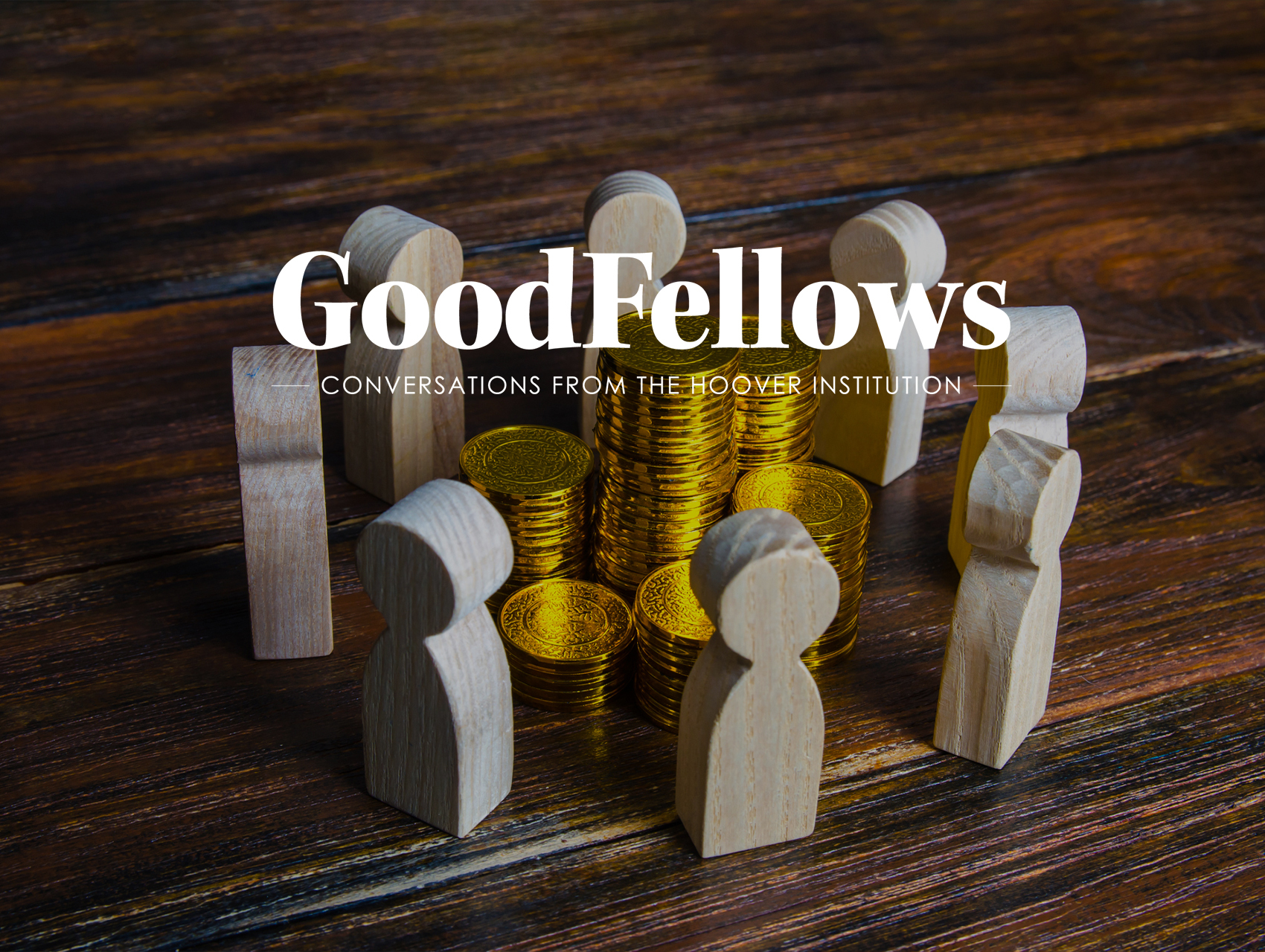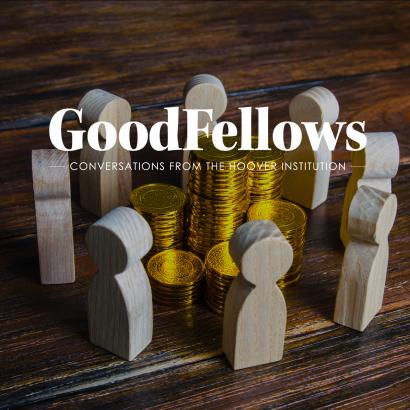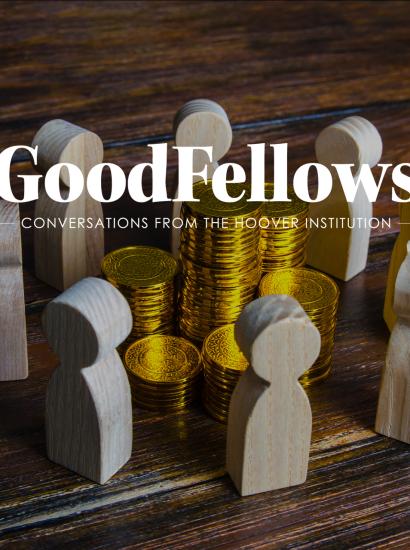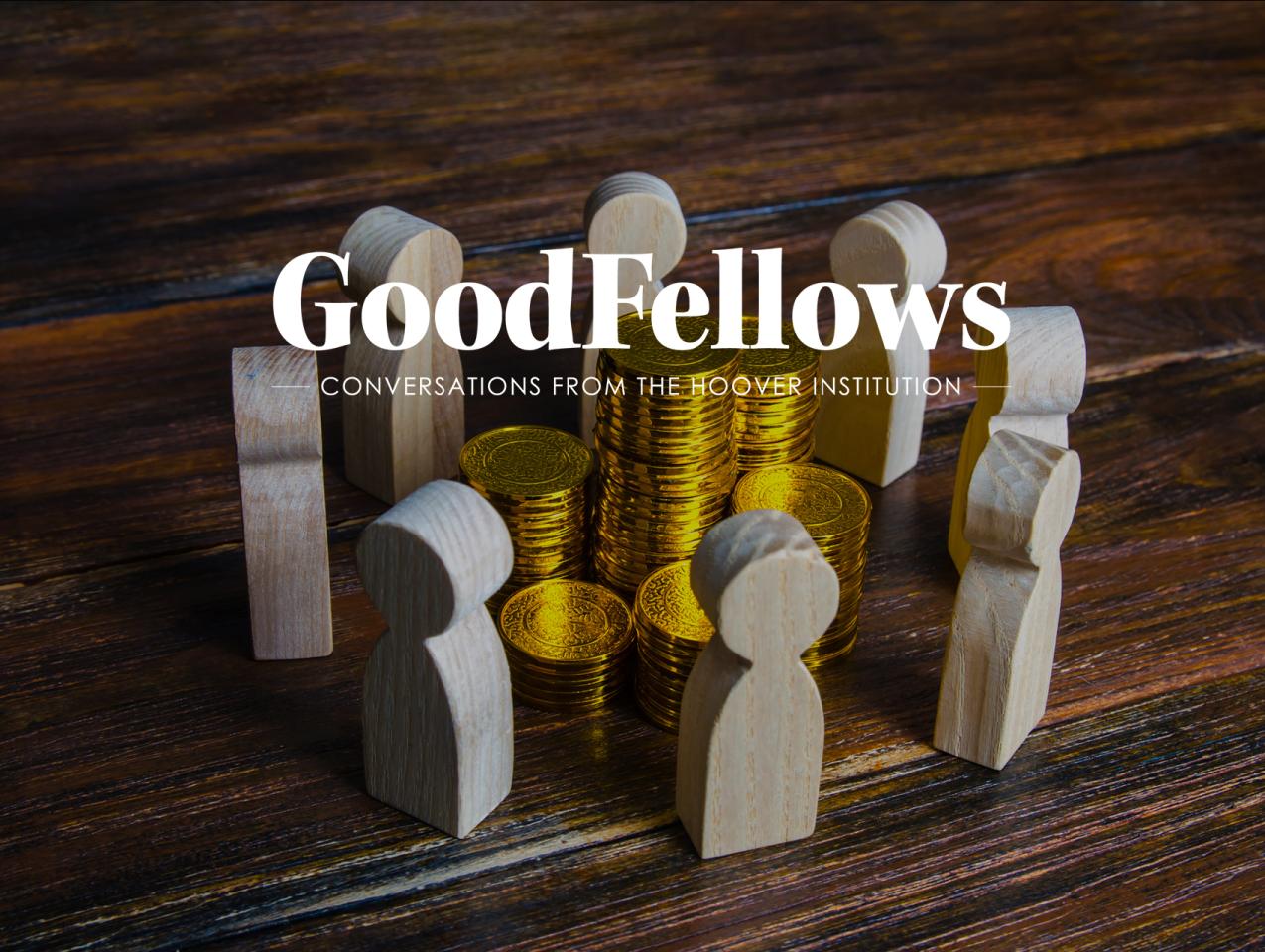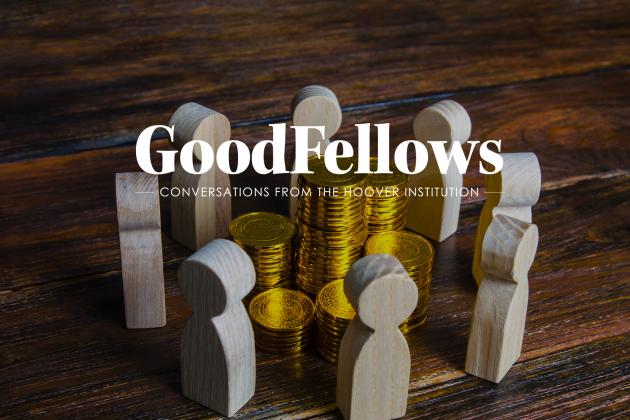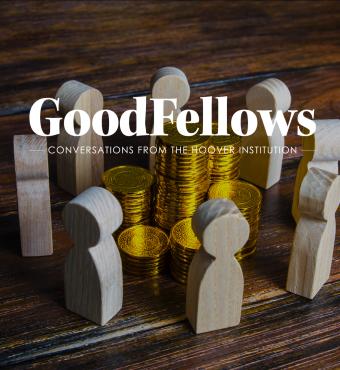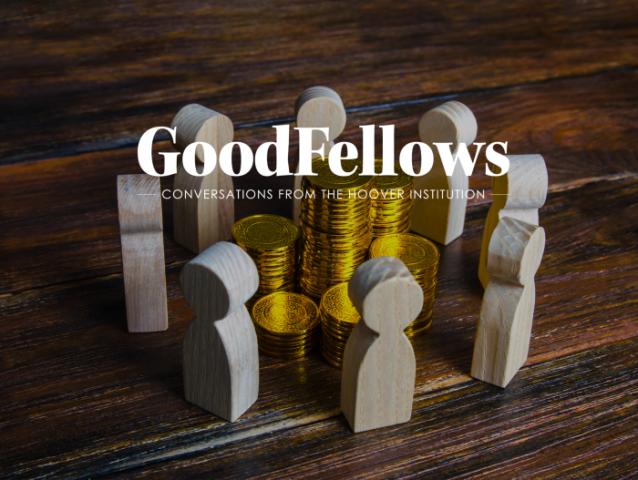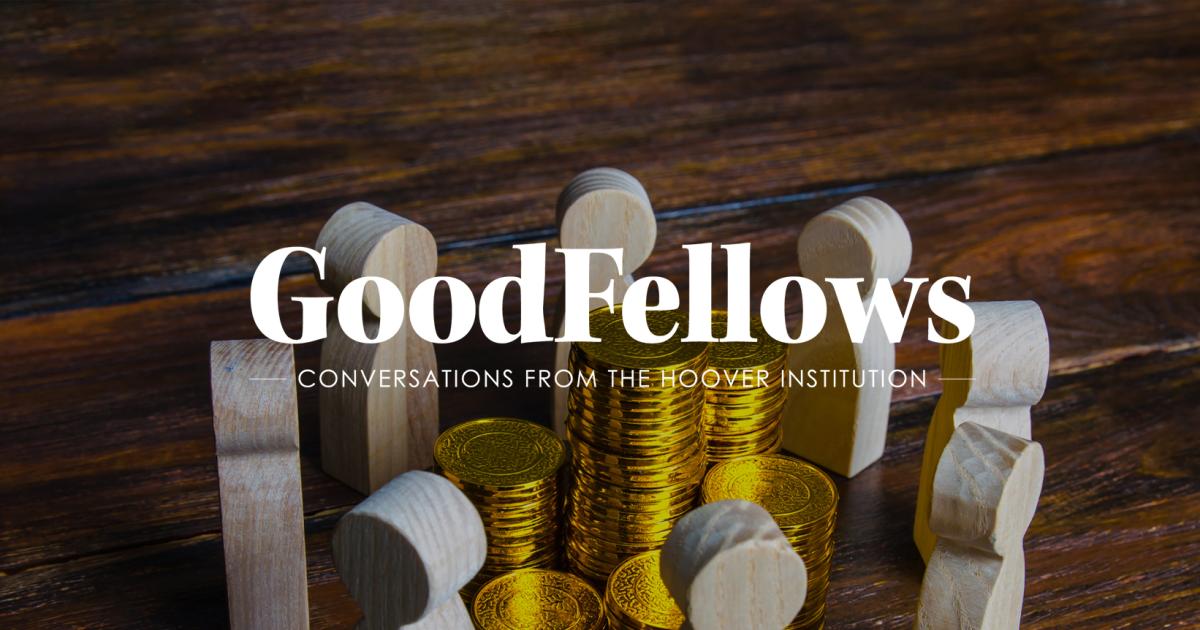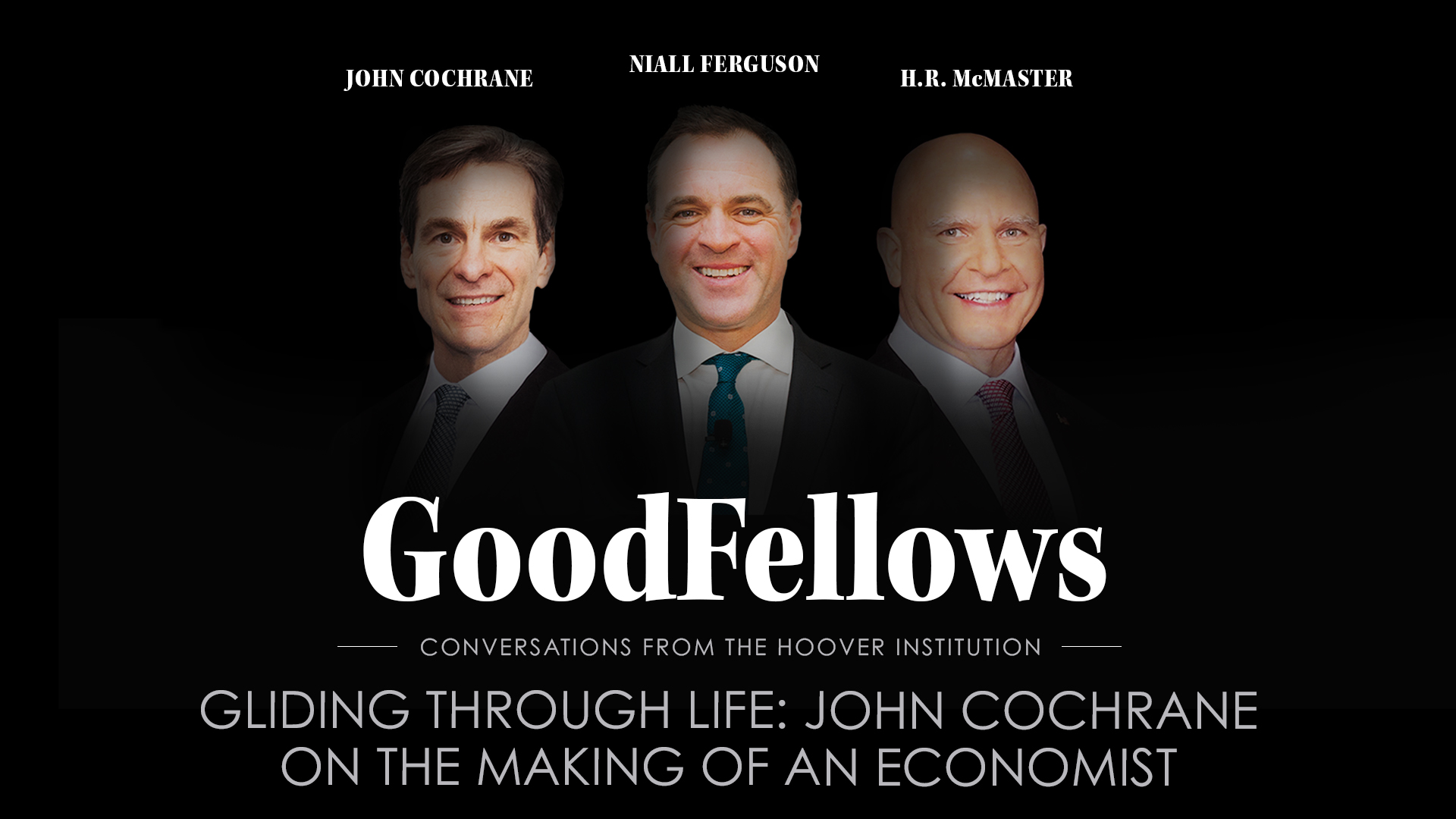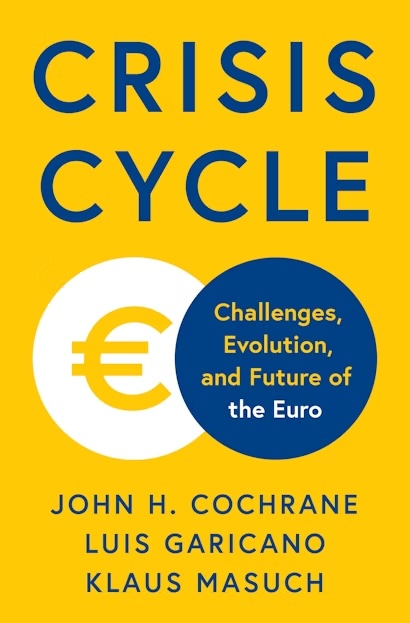- Economics
How does a promising young scholar go from dreams of designing glider planes to the study of physics and then on to a celebrated career as one of the world’s foremost monetary economists?
In a “solo” installment of GoodFellows, John Cochrane—Hoover’s Rose-Marie and Jack Anderson senior fellow and coauthor of the newly released Crisis Cycle: Challenges, Evolution, and Future of the Euro—discusses his academic journey, his mentors, and the fellow economists who’ve inspired him along the way; his ongoing concerns with inflation and debt; plus his interest in penning a follow-up to Milton Friedman’s Free to Choose. Later, John takes part in a “Herbert Hoover Questionnaire,” in which he details proper airplane etiquette (if you occupy the window seat, raise the shade!), describes the virtues of his beloved family dog, and extols the culinary skills of his wife (author Elizabeth Fama, who makes a cameo appearance at the show’s end for the couple’s 39th wedding anniversary).
Recorded on June 12, 2025.
>> Bill Whalen: It's Thursday, June 12th, 2025, and welcome back to Goodfellows, a Hoover Institution broadcast examining social, economic, political, and geopolitical concerns. I'm Bill Whalen. I'm a Hoover Distinguished Policy Fellow, and I'll be your moderator today. Looking forward to a spirited conversation, not with three, two, but one Good Fellow.
In fact, maybe you should rename the show Good Fellow instead of Goodfellows. And here's the reason why we have only one Good Fellow on Summertime has hit the Hoover Institution, and we dial back Goodfellows a little bit in the summer. You'll notice this. We'll have a couple of shows out in July as well as August, but to keep you engaged, we periodically will give you a one-on-one Goodfellow.
And that's what today is. And the first one out of the shoot, it's the Hoover Institution's Rose-Marie and Jack Anderson Senior Fellow, author of the Grumpy Economist blog, Wall Street Journal columnist, and he has a book coming out next week, we're gonna talk about. Please welcome John Cochrane.
John, good to see you.
>> John H. Cochrane: Thanks, pleasure as always. And wow, I don't have to fight for airtime this week.
>> Bill Whalen: At long last, no Niall, no H.R. Live the dream.
>> John H. Cochrane: Yes.
>> Bill Whalen: Yeah, you just got back from a flight. I hope your flights did well for you yesterday.
I know this, I had a real adventure flying a couple of weeks ago to South Carolina to see family. But I got there and I got to spend a few days with my sister's grandsons and they're really fun to hang out with, John, because they're between the ages of 9 and 7 and they're becoming little men.
And they think they've got the world figure out. And the latest episode is that they now know what they want to do with their lives. Two of the boys want to play football, one of the boys wants to be a millionaire. And the fourth one, John, this is the one I have my eye on because I can't decide if he's gonna be an underachiever or white collar criminal, he just decided he's not gonna do anything, he's gonna live with his wealthy cousin.
So they've all got their lives mapped out. I mention this, John, because we all go through life trying to figure out what it is that we should be doing or what it is we want to do. Sometimes we know this before college, sometimes we discover during college, sometimes we have a career course correction after college as well.
But if you're lucky, you land on what it is that you really enjoy doing this and you seem to really thrive at being an economist. My question to you, John, when did you decide to become an economist?
>> John H. Cochrane: It was a long process and you hit on important things.
You have to find something you really enjoy and something you're good at and avoid the things that you're bad at. So learning I was bad at a couple of other things helped a lot in that decision I had gone to. And I do want to say also I was lucky to be born in an era where you could move around and try things in a way that I don't think is possible or easy anymore.
I went to college thinking I'd be an aeronautical engineer. I thought I would design gliders. I quickly learned there's only one job. There's two jobs doing that. They're in Germany and they're taken. And the aeronautical engineering major I saw hypersonic flow and propeller theory, said, I'm not interested in that.
So I turned this physics, which I had loved as a high school student. I had a fantastic high school physics teacher and I loved physics my four years at MIT. And I really to some extent regret not having studied it further because it was beautiful. But I recognized some of the limits of what I was good at and that wasn't going to go well.
There weren't that many jobs. I'm not smart enough to be a theorist. I'm certainly not organized enough to run a lab. And I'd taken two economics classes in college. They were my humanities distribution requirement. Interesting, I love the micro class. I thought the macro class was awful even though it was taught by Bob Solow himself.
But I thought economics was really cool because you get to use the tools of freshman and sophomore physics in the same kind of CLE theory to talk about important social problems. So called up Berkeley. I called up all the places that let me in for physics grad school and most of the big, Harvard, MIT, Stanford.
You can't change your major in August for coming next September. Apply with everyone else next year, buddy. But Berkeley and Chicago let me in. And this is in August no Internet. I wrote them letters on a typewriter saying, can I change my major physics, to economics for grad school?
And they let me in. Never happen today. So I knew it didn't snow in Berkeley and it snowed in Chicago. So I went off to Berkeley and had just both a wonderful time and a conversion experience. Learned a tremendous amount and that's how I became an economist. And I kept dabbling in different things which wonderful that you could do in economics, jump around.
So that's how it all got started. It fit in with also sort of a political evolution of sort of becoming a libertarian at the time. So the learning economics and figuring out the wonders of freedom and free markets came at the same time.
>> Bill Whalen: And then do you encounter economists who have this split in their education?
They go one way undergrad and then they go economics postgraduate.
>> John H. Cochrane: Yeah, economics undergrad is typically not that great preparation for postgrad economics. Well, because rightly so, economics undergrad is produces, it's a gentleman's major or gentle ladies major in many cases. It's a great thing to do to go to business school or law or something of the sort.
But learning to be a research economist, you have to kind of start over again much more. Learn the mathematical modeling. I think it would have been helpful to take more undergraduate classes and kind of know where I was going more. But the modeling skills that I learned and the applied math that I learned as a physics major turned out to be really key to doing physics in grad school.
There's a lot of us fallen physicists in economics.
>> Bill Whalen: And doing Goodfellows. Now, do you wish you taken more time behind a mic? Maybe done some drama, some stage work or.
>> John H. Cochrane: Yeah, actually teaching is wonderful. A lot of academics, teaching which I find kind of reprehensible because who pays the bills?
And it's kind of your duty to spread things to the next generation. But teaching and the difficult MBA teaching was really good in the end. Trial by fire for communication, distilling ideas, meeting people where they are more effective writing. Yeah, that's where I learned to do that sort of thing.
>> Bill Whalen: In public speaking as well. You were just giving a speech in Milwaukee yesterday, for example.
>> John H. Cochrane: I'm not great at it. My wife keeps, she watches Goodfellows and says, John, you gotta shape up, finish your sentences, think a little clearer so we could all be better at it.
And you're right. As learning to write is something. It's a skill you need to learn as a young economist, learning to speak is important. I wish I could be like Larry Summers, who will show up at a conference, think for three minutes, and then say item one, item two, item three, boom, boom.
Richard Epstein is that way too. He just talks and it's like chapter heading, paragraph, paragraph, chapter heading. I'm not that good at that. And when I see transcripts of what I actually say, I'm always embarrassed, but so we could all learn to be better.
>> Bill Whalen: Yeah, there's a joke in broadcast radio, John, that that when a DJ plays the song in a godda devita by Iron Butterfly, which goes on for like, 15 or 20 minutes, that means he's probably going to the men's room.
I kind of joke. I've done podcasts with Richard Epstein in the past, and he's a brilliant mind. I love talking to him. But Richard, kind of the same way. If you ask Richard a question, you can walk away sometimes for 10 or 15 minutes.
>> John H. Cochrane: Well, I have problems.
>> Bill Whalen: First, you have to go back, and.
>> John H. Cochrane: That is a key of public speaking. I have that problem of giving too long and detailed answers. It turns into a speech or a A lesson. So the talent of thinking of what's just the right thing to say and saying just that right thing is, is what I need to keep working on.
And I'll stop that one there just to try to implement the same advice.
>> Bill Whalen: So that sounds like then a writing for the Wall Street Journal where you're limited to what, about a thousand words, twelve hundred words. And that sounds like a challenge for you.
>> John H. Cochrane: Nine hundred.
And my God, is it a challenge? In a way, it's why I do a blog. You know, why is each blog essay not a Wall Street Journal op ed? Well, a blog, I boom, boom, boom, boom, boom, boom. You know, three hours draft and a half, it's, it's done.
Then to send it into the Wall Street Journal, you got to first get 2,000 words down to 900, not one word over 900. And then you beat back and forth. It's like a haiku. Every little sentence counts. It's, you know, the product is better when you're done, but the time and effort is a lot harder.
>> Bill Whalen: Yeah, I think it's Dorothy Parker John, who said, I hate writing, but I love having written. Is that the case for you? Or do you also like writing?
>> John H. Cochrane: Right, writing is always hard. Writing is all editing. And I should say, a little note to my fellow economists, this is not a talent, this is a skill.
And I put some effort into developing writing as a skill. In part, I'm young enough that I never had what are generation before, had somebody who sat down with you once a week, made you write a page of prose, and they knew what they were doing and really, you know, showed you how to do it.
I had to learn all that on my own. In part, I was very influenced by my father, Eric Cochrane, who was a wonderful writer. But I grew up watching him on an electric typewriter, do the fifth and sixth and seventh draft of, of each book because he cared about the prose and he wrote a wonderful little mimeo, that's what it was back then for his students called how to Write Historical Prose.
And so I recognized that and then I put a lot of effort. Zinser, who's a distant relative, wrote a great book on how to write nonfiction prose. I really studied that and mostly just paid attention to what do I like, what do I not like, to find some rules in my own writing.
I'm not great at it, but I'm a lot better than I was. And dear young economists, you are mostly an author. Your prose really matters. Learn to do this and don't learn to do it by following the examples of what you read in academic journals. Because they will take.
If you, if you start writing like academic journals, you will take what might have been some decent skills in the beginning and just completely destroy them.
>> Bill Whalen: Now, you came to Hoover via the University of Chicago. I think you came to hoover, John, in 2015. Not mistaken.
>> John H. Cochrane: Yeah, 2014 is a visitor and then 2015 for permanently.
>> Bill Whalen: And I think that makes you actually the Senior Goodfellow because you might have beat Neil here by a couple of months. And hr, well, HR was a National Security Fellow a long time ago, but HR came to us after his year of duty at the, at the White House.
So you, you're the senior of the three.
>> John H. Cochrane: It's funny because when I was hired, of course I was the youth movement. Uber had not hired senior fellows in a while. And so John Raisin, who hired me, said, John, you're the youth movement. I was 57 at the time.
So I said, you got a problem, buddy, and I'll take some credit for helping to bring Neil on. Neil was kind of dancing back and forth. So we sat down outside on a beautiful afternoon out in the Japanese trees in front of Hoover, and I think I had an influence with him to come to Hoover and to structure it.
Right.
>> Bill Whalen: I mentioned Chicago. Chicago is the home to some legendary economists, Gary Becker and of course, Milton Friedman. My question to you, John, if you were to create a Mount Rushmore for economists, if you put four faces up on the side of the mountain, would Friedman be one of those three, who'd be your four choices?
>> John H. Cochrane: Absolutely.
>> Bill Whalen: So Friedman's one.
>> John H. Cochrane: Milton Friedman. Now, do I only get four? So there's. In terms of academic economics, and this will be partly based on my own, you know, where I ended up. Bob Lucas and Gene Fama are absolutely important there. Bob is actually with Milton and possibly more than Milton, even important for the development of macroeconomics in the 20th century and a tremendous person.
I didn't really know Milton personally. He came and visited Chicago every now and then and would take the assistant professors out of lunch. So what are you working on now? And you had better have had a good answer to Milton. But Bob was, was around and just a superb economist and a superb human being, as Gene Fama is also a superb economist, superb human being.
Very different talents, Bob and Gene, and both of them just ethical straight arrows. You just, you do things right. You don't. There's all sorts of shenanigans in, in academics, and neither of them would ever do any of that, that I would, that, that was important to me. As well as
>> Bill Whalen: three names, we've got one to go.
>> John H. Cochrane: Tom Soul. I'll put him on my list of. Spectacular economists
>> Bill Whalen: who turns 95 in a few days, by the way.
>> John H. Cochrane: Yes. And good health to him. And one thing I'll tell you about Tom Soul, I've been in over 11 years.
I have seen him once, met him 0 Tom's and he shouldn't be meeting me.
>> Bill Whalen: John, I've been here, I've been here twice as long as you and I've seen him one time he was coming here to do an interview at C span. So he came to the door and took a right and went off and that was it.
>> John H. Cochrane: Yeah. One thing I've learned from all of my, all of my great heroes, they are people who know how to defend their time.
>> Bill Whalen: Yes.
>> John H. Cochrane: Especially as you get older in this profession there's lots of people who want to soak up your time with lots of junk and they know how to focus attention on the important research thing that they're going to do not get.
Would you write us a keynote speech and an introduction to the volume of X, Y and Z? No, I'm focusing on what's important and they know how to defend their time. I wish I could learn that talent.
>> Bill Whalen: Well, but you're pretty busy yourself and so why don't we make that opportunity to talk about the book which comes out on June 17.
The title Crisis Cycle Challenges Evolution and Future of the Euro. It is available on Amazon for those people who want to pick up and read it. It's also by my count, the third Cochrane book. I found two others on Amazon.
>> John H. Cochrane: Depends how you count. I have a whole bunch more that are sort of co edited the whole sequence.
>> Bill Whalen: So I found, I found the Fiscal theory of price level and I also found Asset pricing.
>> John H. Cochrane: Yeah, those are my sole auth. So this is, well, The Fiscal Theater, Price Level, Master Pricing were sole authored and I have a bunch of other books, but let's not quibble.
Yes, third big book.
>> Bill Whalen: Okay. This also, by the way, this makes it the second book that you have put out during the Goodfellows years. So that puts you in a tie with the hr. Puts you one ahead of Neil Ferguson by the way.
>> John H. Cochrane: Well he's gestating the biography of Henry Kissinger and I, I am just amazed at the productivity in writing of hr.
Both HR and, and especially Neil Neil because he's on the plane all the time. As you know, it's next to impossible to nail him down for Goodfellas. It's one of the things I love about Goodfellows. You nail down Neil Ferguson and make him have a structured conversation, you know, so he has to be on the ground to do that.
So,yeah, Euro Crisis Cycle, a book written with two wonderful co-authors, Luis Garicano, who is currently at London School of Economics, was at the University of Chicago and was a member of Parliament for the European Union. He stepped up and, and served, served his country and, and his continent, which I really admire.
And Klaus was a longtime person at the European Central Bank. He was the guy in charge of Greece. So he actually knew where the bodies were buried and what all the Alphabet soup of acronyms mean. And, and educated Luis and, and myself on how everything worked. So it was a wonderful collaboration and I'm very glad the book will be out next week.
Only 35 bucks from Princeton University Press. I think we're the cheapest book on the Princeton press website. Another 30% discount, I think, if you put in the code PUP30 today. So run out and buy it, everybody.
>> Bill Whalen: Okay, so why the euro? Why this topic? And why a book instead of just say, a paper?
>> John H. Cochrane: Well, why is the book as short as it is, is the big question. I wrote this book, Fiscal Theory of the Price level, capping off 30 years of thinking about monetary and fiscal affairs together. Where does inflation really come from? And so forth. And Luis, who had been talking to Klaus already about the euro, who's been a good friend for many, many years, said, john, we need to write a book on fiscal theory of Europe.
And I said, that's a great idea because I had sort of thought about how does the Euro fit into the fiscal theory? And there's, you know, a chapter back in the end of Fiscal theory price level about that, but I was kind of guessing. I didn't really know how it worked too well.
So to be forced to sit down with two guys who understand Europe perfectly and think about the fiscal monetary foundations of the Euro was just a wonderful chance. And then it went on from there. And it was a great partnership. Klaus knows all the gobbledygook and, you know, he would talk in acronyms and then Luis and I say, what does that mean?
And then he would say, well, here's how this works. And we go, we don't understand that. So just in part explain it to me in simple terms. And then we write. That was, I think, very useful. I'll pitch the basic idea of the euro effect. If you're going to give me another 30 seconds.
>> Bill Whalen: No, please do. Because to the uninitiated, the most they know about the euro, John, it's a currency they get when they go to Europe. So they're just interested in exchange rates more than anything else. El so explain why this is me too.
>> John H. Cochrane: And there's nothing I like more than than visiting Europe.
Nothing like I, I like more than my cappuccino and pizza being, you know, cheap when I get there. And in part I'm a Europhile. I spent a lot of time in my youth in, in Europe. So, you know, my, my sympathy is for Europe and my sympathy is for a European Union for free trade.
I think it's wonderful. So, you know, I want to help fix it. Well, you know, not for all sorts of reasons, not just cheap cappuccinos.
>> Bill Whalen: Right. But the essence of the book.
>> John H. Cochrane: The essence of the book. Please stop, stop dissembling, John, and get to the point, I gotcha.
So the euro is a common currency, as the US Dollar is a common currency across the many states. It's a good idea if you want to have a large integrated economy. But it is a common currency, a monetary union without fiscal union. So the individual countries still maintain their taxing spending and borrowing capacity and a lot of their individual economic policies.
Now that leads to an obvious problem, which is the government of Greece could borrow way too much money, use it to, you know, buy Porsches, and then say, my God, crisis. We don't have any way to pay it back. Ecb, print some money, bail us out. Because it would be a terrible catastrophe should we have to default on this debt.
So you can see that that problem might be a problem in the US we haven't tested what happens when states like Illinois, California and big pension systems go under. Will the federal government bail us out? And will, will the Fed bail those out? We have a federal government with big taxing power.
The European Union does not have big taxing power at the EU level, so it's not even that easy for them. So the obvious problem, and you can see fiscal and monetary policy, you can see why they brought me on board for that. Now the people who set up the euro were really smart.
And as I look at it, I go, wow, these guys. Nobody in 1990 was thinking about sovereign debt problems and so forth, but they recognized that this problem was there and they did a pretty good job of setting up the euro. The European Central bank has one mandate, price stability, nothing else.
It's not supposed to buy sovereign bonds, and that helps. Countries are supposed to follow debt and deficit limits so that they don't get in trouble in the first place. These people thought about it. Now they didn't write down every little detail. In particular they didn't really talk about.
So do countries default just like companies? Is there a bankruptcy mechanism? How is that going to work? And in particular do we make banks treat country debts as risky the way they have to treat corporate debts? Or can they keep up the fiction that countries will never default when they buy sovereign bonds?
Now why didn't they do that? Well, the night before the wedding, you don't want to really push too hard on the prenup, right? We're trying to get a bunch of countries together. So, you know, the Germans sitting down with the Italian saying, now what happens when you don't pay your bills?
That's not a good way to, you know, have a pleasant wedding night. So they kind of left that one. Well, we'll figure it out if the time comes. And that's wise too, you know. You know, you write a constitution, you don't write every single law. But as now, now we get into the.
That's the setup part of the book, the history part of the book. Crisis after crisis. First the French and Germans said, yeah, we don't want to deal with the debt and deficit rules. And they kind of got away with it. So people say, well, what are these rules for?
Then of course, the financial crisis, the ECB ramped up its interventions. The sovereign debt crisis was the big earthquake where Greece threatened to default, which would have brought down a lot of German and French banks. And so what are we going to do about that? And that was kind of chaotic because there was no real mechanism for default.
The banks, this is one of the big problems. The banks are stuffed with the sovereign debt. So if the sovereign goes down, the banks all go down. So there's a kind of a hostage in the banking system to not let the sovereigns go down. And then, so that that crisis, a kind of a good system emerged from there.
There was a system that my co author Klaus was very responsible for putting together that would allow in the end a restructuring where people would take some losses, but the country would get help in return for promises to put it back on solvency. Sort of what the IMF does for international crises.
But then that got kind of put on the back burner. And so the QE era Covid the Russian invasion of Ukraine, the inflation, and now we're kind of back to a pretty bad equilibrium. The ECB holds a lot of government debt. It is able to buy government debt anytime it feels the need with not many rules in its way.
And markets all expect that anytime there's any blip, any hiccup in Italian, Greek or now French yields or bonds, that the ECB will step in and buy them. And that the problem is the problem of incentives. All of economics is about incentives. So with that situation, countries don't feel the pressure to fix their fiscal problems.
And they've got fiscal problems just like we've got fiscal problems. They don't feel the need that they don't see the market interest rates going up, saying, hey, you better watch it a little bit here. They don't feel the pressure to reform their economies to grow. Europe's big problem is not monetary and fiscal, it's that it stopped growing.
And we kind of know why. Too much regulation. But one great way to pay off your debts is to allow that microeconomic growth, which means all sorts of people who are benefiting from the current system, they'll benefit. And we've still got this thing where the banks are all holding sovereign bonds of their country in undiversified portfolios and they're allowed to pretend sovereign debt is risk free.
So it's a great trade for the banks. Borrow very cheap from the ecb, buy as much sovereign debt as you want to, which pays high interest rates and it's like an arbitrage. So of course, they're stuffed with sovereign debt. And the local regulators love them to be stuffed with sovereign debt.
So it's a fragile system. They got through, they did what they had to do. In a crisis, everyone bails out, but afterwards you need to fix the system and fix the incentives and that. And it's not an individual problem, it's kind of Europe as a whole has a lot of things where it needs to fix the system and fix the incentives.
So that's where we are. And then we have a bunch of recommendations on how to fix this stuff and get the incentives back in line.
>> Bill Whalen: Christine Lagarde was the president of the ECB, John. She gave a speech, I think it was in Berlin in May, and she referenced what she called a, quote, global Euro moment.
What was she getting at, John? And do you agree with her assessment that there's a global Euro moment? I assume she's talking about trade wars between China and the United States and dollar fluctuations and so forth.
>> John H. Cochrane: Well, I don't want to say what she means, but I can channel some chatter I'm hearing from Europe.
Yeah, if the US wants to shoot ourselves in the foot, ankle, knees and kill, keep going north by cutting ourselves off from the rest of the world, then there is a moment for Europe to lead the global free market. Open trade, prosperity. Now, Europe is not that well positioned for it, Madame Lagarde, because there's a lot of external trade barriers, there's a lot of internal trade barriers.
Europe is not a free internal market. And let me advertise my colleague Luis Garricano, his, my co author, his blog Silica Continent is wonderful on all things Europe and lists all the ways in which it's hard to trade inside Europe as well as outside Europe. And of course Europe is a regulatory nightmare.
There's a reason there's no AI in Europe. There's a reason and energy is fleeing Europe. It's de industrializing fast. So it would be wonderful were Europe to seize this moment and we're part of a very small part of that to become the free market, free trade, property rights, efficient regulation, state capacity, governments that know how to get things done at halfway reasonable cost, lead the global trading system.
I'm not quite sure Europe is, is ready to sit up and do that now that there's a lot of chatter about replace the dollar as the risk free asset. And I would say that's nice. But doctor heal thyself first, make sure that the euro does not fall apart in the global sovereign debt crisis coming in which everybody runs away from the dollar.
bBecause you know, China invades Taiwan, there's going to be a global financial crisis. Stress on the dollar as the US tries to borrow a ton of money, but stress on the euro as all those countries get in financial trouble too. So, you know, your number one job is survive and then you can worry about competing with the dollar.
>> Bill Whalen: Yeah, speaking of moments, Sean, we've had a moment when it comes to talking about inflation. And I found it really fascinating to eavesdrop, to just sit in on your monetary conferences. Each year Hoover puts together a gathering of economists and it's fascinating to kind of get your temperature on things.
I remember a couple years ago this is a room full of angry economists talking about how the Fed approached inflation. So I'm not sure how your temperature is on the Fed right now. But having had a moment on inflation, John, do you think we're headed in the next five years or so to have a moment in a conversation about debt?
>> John H. Cochrane: Well, we seem to be having that conversation now. Now I'm a little bit chastened. I've been holding up that sign saying the world is ending for 25 or 30 years about debt and out of control deficits. But it does seem that we're kind of waking up. Of course in the US the real problem is the spending.
Our tax code is horribly inefficient. It needs reform more than anything else. But are we going to get serious? And that has to happen in many ways there's there the attitude was until 2020, solve every problem with a river of government money, which goodness knows we did during COVID 5 trillion bucks out the window, a lot of it to Nigerian scammers.
So you know, we got to be serious about debt has to be repaid. So I definitely do think this is the moment now to Christine Lagarde. Europe is not really clear that debt is a problem. Germany is, is going, is going to weaken its, its admirable debt break legislation to allow itself to borrow for military reasons without having to cut back on a huge welfare state.
And, and a lot of Europe is cheering that as great, we'll get stimulus guys, didn't you learn about stimulus in 2020? We everyone spent 10 years saying the route to success is if only the government could print and borrow money and throw it out the window, we would all be.
We would all be growing like crazy. And they, we did what they asked and we got inflation out of it. Likewise, you know, I'll tell one more debt story from Europe. Italy's super bonus is I think what happens when you don't really face markets and reality about death.
This is a plan that came in in the sort of huge Covid spending splurge. And Italy said using a lot of European Union money, if you do energy efficiency upgrades to your house, you can have 110% tax credit for the costs. Now you know, energy efficiency. Who could be against energy efficiency?
Just think, think a second. Italians are very clever entrepreneurial people. Offered 110% reimbursement of cost as a tax, as a transferable tax credit. Enzo Luigi, the bill isn't really high enough. Do you think you could put some like gold plating on that, you know, energy. So it's just been a morass.
Of course now the contractors love it and the banks love it and they're, you know, even Giorgio Maloney is having trouble getting rid of this one. That's the example of the kind of mentality that happens when you're not serious about debt. So short. Didn't I say I was going to give you short answers today?
I do think we're coming to a moment that we're worrying about debt but we're not yet understanding what needs to be done. Which is not a year or two of austerity, not budget gimmicks, not we'll have a temporary tax this and then phases out. Then the answer to debt is you need to have a reformed tax system that raises good revenue at low marginal rates.
And a simple one, you need to have spending that vaguely makes any sense, not down rat holes. You need to solve the disincentives of social programs which is their, their major problem. And you need const confidence that no matter what happens, we will return to decades of small primary surpluses to pay off debts past the budget window.
And it's really not about specific CBO forecasts. Everybody understands that, yes, Congress is responsible, administrations are responsible, whenever whatever is happening now is over are structural fiscal policy will be steady, small primary surpluses in a strong pro growth economy because tax revenue is tax rate times income. Grow the income is the easiest way to do it.
That's just a different mentality than most people have when they talk about deficit problems. So I think we'll get there, but maybe you will.
>> Bill Whalen: And what would be the trigger event to start this? John, you mentioned Taiwan, for example. Back here in the United States, would it be in a crisis with an entitlement program or?
>> John H. Cochrane: I hope the US does not need a crisis to reform.
>> Bill Whalen: Right.
>> John H. Cochrane: Because reforms undertaken in a crisis tend to be not very well thought out. For example, you know, the Dodd Frank act, there was a crisis and to their credit, they said, hey, we got to do something and not let this happen again.
And you know that that impetus to reform is what has gone away in the US and in Europe. You know, the euro had five crises like that. And nobody said this was a mistake. How do we fix it? They said, great, we bailed every route, you know, on to the next, we'll bail out again.
That's what, you know, we're doing. 2020 was a massive bailout. It was the same size as 2008. And nobody is saying we made a mistake. Yeah, great for us, we bailed everybody out. So during a, you know, Rahm Emanuel said don't let a crisis go to waste. But at a minimum, you have to have really well worked out plans on the shelf if you're going to implement in a crisis.
But I think it's much better if you want long run sanity. I mean, we just need to do the sorts of things that your grandmother and Marie Kondo would tell you to do. Simplify the tax code. Dramatically simplify the tax code, lower marginal rates. Simplify the, simplify and unify the entitlements programs.
But you know, that takes work and it's very hard to do if you're just, if you're trying to plug the holes in a crisis. And so typically when there is a crisis, you know, look at Greece, they had a crisis. They're actually doing pretty well now. And they, they are doing well in their government budgets, they're doing well in economic growth.
They went through horrible years. And I, I don't think the US wants to have a crisis like China invades Taiwan, financial meltdown, global trade meltdown. Uncle Sam says, I need to borrow $10 billion. Financial market says no, then we don't have enough money to meet the need. We have an unmet financial crisis.
We have years of economic depression, plus global, you know, global setbacks. And then we finally get our act together and reform and get out of it. That would be awful. So I hope instead, you know, America has done reforms before and many countries have said this isn't sustainable.
Let's get together and fix it. The 1980s had a Social Security reform that put it on a stable path for decades. It might not have been perfect, but they did it. They had a spectacular tax reform in 1986. They deregulated. It is possible for America to do things like that.
And let's hope-
>> Bill Whalen: I'm curious, John, I'm curious if we kind of revisit the Tea Party at some point. Because if you, if you look at recent political history, Ross Perot runs for president in 1992. He runs very hard on two things. One is lousy trade deals. NAFTA he went after, and he also ran after, very hard on debt.
Now, Perot in the Reform Party movement doesn't work out, he's out of it by 2000. But by the end of the first decade of the 2000s, we have this thing called the Tea Party movement which is all worked up about debt. And then you can argue the Tea Party gives way to Donald Trump in terms of angry populism.
But Trump's mo, John, is not solving debt problems, is it?
>> John H. Cochrane: No, Trump, Trump's M.O. is managing bankruptcies. He might be just the perfect president for the moment. You know, fundamentally this needs Congress and this needs, you know, reform of how we do our spending and how we do our taxes.
And you know, Doge came in because the Office of Management and Budget failed and the Budget Empowerment and control act of 1974 failed and the Inspectors General failed and the transparency.com failed. And you know, all the institutions we have to try to make things work are, are I'm being too extreme, but, but you know, need fixing.
So I think focusing on the debt is actually the wrong answer because it, if you focus on the debt, it says, well, raise taxes. Well, the all in marginal tax rate on high earners in the US is already, you know, as high or higher than Europe. And you raise taxes on everyone, then you get European growth out of it if, if you're lucky, cut spending.
Well, you know, there actually is some useful stuff in there as, as well as the useless stuff. So, you know, focusing on the debt as the problem, I, I think is a mistake because what's the real problem is the institutions by which we choose how much to spend and how to tax and, and how to regulate and if you fix those, you'll fix the problem.
And in that sense, the Tea Party sentiment is one I'd like to bring back. Give me back my country. Give me back institutions that are competent, you know, like J. Bhattachary is off to fix. We saw our public health institutions showing complete politicization, incompetence. Our universities are suffering an immense lack of trust.
Those institutions need to be fixed. The basic institutions of, of Congress. You know, let's pass laws and let's do it. You know, let's obey our budget rules or at least come up with better budget rules. Rule by executive order taken under a decree of national emergency. I don't wanna see even heavy-melee come to the US and try to fix us that way.
So the Tea Party sentiment of let's get back to our constitutional order I think is a good one.
>> Bill Whalen: Yeah, I think. Speaking of these issues, John, the immigration issue maybe how about a minute on immigration, Justin, while we're talking about dysfunctional. Problems, immigration tariffs, health care, bank regulation, I'm ready to go and nobody can stop.
The right wants to hammer on criminal behavior. The left wants to talk about sad stories. Congress does not wanna touch immigration reform of the ten foot pole. Im sits out there, the problem continues to fester and here we are in California. John, it's been 30 years since Californians voted on immigration and the problem keeps going on.
>> John H. Cochrane: Well actually most of Congress does want to work on immigration reform and there's a kind of an outlines of a bipartisan consensus on what needs to be done that unfortunately the leaders of neither party want to bring forward. And that's it instance of how our Congression, our congressional mechanism is, is really broken that you know, sort of basic simple reforms can't pass.
Now I'll give you the economist's view. Our immigration system is broken because what it has consisted of in so far has been a lot of tolerated illegal immigration. And that's just a bad system. You know, people around us who don't have the protections of lies is not a good system.
You can get to the US if you're willing to walk across Central America and scam the asylum system or family reunification. That's not a good way to run an immigration system either. Now from an economic perspective we need immigration. Immigration is a great and wonderful thing and you know that people want to come to this country, work hard, pay taxes, start businesses, pay off our debts, take care of us when we get old, be nurses in our overpriced hospitals.
I mean remember, teach schools there's all sorts of our problems would be helped a lot by immigrants. And we want economic immigrants. You want young people, well educated people that we let students in, give them degrees, and then kick them out of the country. Is, is just insane.
And remember, every economic migrant, he's not stealing American jobs. He's working, he's building houses, or she is building houses or doing gardens. But then, they go down to Home Depot and Walmart, buy stuff just like we do. Every new person is a consumer, is the source of demand as well as a source of supply.
So young, energetic, energetic, educated, economically productive people are a great boon to this country and a central part of, a central part of what made us great. So for an economic perspective, you know what I would love to see is immigration that doesn't focus on numbers, but focus on rules of the game, encourages economic migrants.
Come to the U.S, show us you got some money. Show us you got a job. Show us you won't be on social programs for a while. Maybe put a bond at the border. That's a Gary Becker idea, which is of course an obvious one for the economy, economics, pay your taxes.
I don't mind if you have to tell us you speak English and can pass the citizenship test, which most Americans can't pass, and then come to this country and contribute. That's what the Economist would love, love to see. And I think even, you know, Victor Hansen, who complains about immigration on social basis.
If we did that, I don't think Victor Hansen would have a lot to complain about. So our system is completely dysfunctional relative to that ideal. And anything more functional would be fine.
>> Bill Whalen: Getting back to our idea of Congress not doing its job, John, in a better world, we would lose the word omnibus and Congress would just take immigration and do it piece by piece, because that's what you have to do here, piece by piece.
But you do it in one big bundle. Invariably it's a poison pill that somebody can't swallow. So they should do, as a separate measure, they should address the issue of immigration and skilled workers and then do immigration unskilled and just kind of go after it, just issue by issue by issue.
>> John H. Cochrane: Yeah, so here you and I are both guilty of playing amateur political scientist, which is dangerous.
>> Bill Whalen: And Pollyannish wants-
>> John H. Cochrane: I'll be an economist on the one hand or on the other hand.
>> Bill Whalen: Yes.
>> John H. Cochrane: An advantage of big bills is that if you can't get everyone to agree on a small bill, sometimes you can say, well, I'll hold my nose on that part if I get to throw into the bill this part.
Now, ideally, a functional system is able to make bargains in which it says, we'll put together a coherent immigration bill and I promise to support you on the farm bill if you promise to support me on the immigration bill. Sometimes you have to staple them together because you can't trust each other.
I think, I think you're right in a system where you can trust each other, but there is a reason sometimes for stapling things together, which is how you get it through. But yeah, the big beautiful mess kind of bill. It also leads to very poorly written legislation because nobody has the time to read it, think about it, debate it, and so forth.
So it is an interesting challenge. I think you and I politically sort of would mouth the belief that, you know, Congress should be doing things, and we think state and local governments closer to the taxpayers should be doing things and be more accountable. But Congress is pretty darn dysfunctional right now, and I don't have magic fixes because I'm not a political science slash game theorist on how to help it be more functional.
>> Bill Whalen: You need a time machine, John. There was a window in 1995 when this could have happened. When Bill Clinton was fighting for political survival, Newt Gingrich was new king of the world, Republicans were ascendant, and Clinton would have worked with them on immigration. But Gingrich did not want to play ball on immigration.
He had other things he wanted to go after. And I think the doors kind of closed after that. JOHN but okay, final question for you before we go into what is going to be an equivalent lightning round about writing a deep philosophical piece about being a glider pilot.
Gliding fascinates me in this regard. I don't like heights. If I had a dream where I woke up and I was on a plane gliding at myself, I think I'd probably wake up in a cold sweat. But it's a fascinating thing to look at in terms of the skills involved, in terms of just how aware you have to be of currents around you, just being cognizant all times.
You can't sit up there and daydream necessarily. Sully Solberger was a glider pilot. I didn’t know that until I was snooping around the other day. But he learned how to fly gliders at the Air Force Academy, and that happened to save a lot of lives one day on the, the Hudson River.
But what attracts you to being glider pilot? JOHN
>> John H. Cochrane: well, there's a book actually in there. I, I did a lot of analytical work on the theory of, of gliding Turns out to map very well into economic theory. Keep meaning to put it into a book, but haven't, haven't done it.
But of course, what's wonderful about gliding, it is many ways, like economics, we use theory to kind of develop some simple tools and then, then you have to apply it in the real world with, you know, time. So we're all world champions on the ground, but doing it in the air under that pressure is a challenge.
And it's sort of a relentless challenge of can I become better? I don't just fly gliders are race gliders. So it's this endless quest for self improvement. Can I learn to not make the same mistakes over and over again? And it is though, it is very sensory. I've also been flying light planes, which is very the opposite.
It's kind of, you know, by the numbers. Watch the instruments. Flying a glider, you do have instruments. But flying a glider, well, is very much a combination of feel the force, Luke, on what is the air around you telling you, but also experience understanding the weather, analyzing what's going on.
You know, I see a cloud or a mountain over there that I think is going to be a good thermal. Can I get there in time? Always, where is there a safe place to land? Together with the joy of flying. If you enjoy flying, go fly a glider.
Light planes are great transportation. Gliders are flying like a bird. And then the challenge of climbing in a glider, we have no engine, and I fly six hours and three to 400 miles every weekend with no engine. So finding rising air, the wonderful feeling of flying. I have dreams, in my flying dreams, I'm thermaling.
I'm catching the rising air current because it's such a beautiful feeling to be going up and sometimes birds join you. And then, you know, flying over the Sierra. I spent, you know, last weekend, I was flew from Truckee down to Mount Whitney over the top of the Sierra at 17, 000ft with this beautiful view of the canopy.
So it's very relaxing. And you cannot worry about the book, about the podcast. Your mind is engaged 110% of the time, so it displaces all those worries. Great, great passion.
>> Bill Whalen: Okay, I am sold. All right, John, there is no lightning round in this episode of GoodFellows, but we're gonna do something you might find just as excruciating.
And that is the first Herbert Hoover questionnaire.
>> Bill Whalen: Okay, well, here we go, my friend. Question number one, what is the best sandwich?
>> John H. Cochrane: Best sandwich. Okay, I'm going to give you one hand, other hand. Economist because I can never make up my mind about anything were I not worried about my weight, my health and everything else.
Of course, pastrami on rye with Swiss cheese sauerkraut. Pastrami Reuben, absolutely.
>> Bill Whalen: Outstanding, all right, second question. Apples or oranges?
>> John H. Cochrane: Okay, on the one hand, oranges are lovely, except they're kind of messy. So oranges on the ground, apples in the air.
>> Bill Whalen: What do you think happens when we die?
>> John H. Cochrane: We rot. Bertrand Russell.
>> Bill Whalen: Which talent would you like to have that you don't?
>> John H. Cochrane: Better facility with abstract math would have been lovely. Better ability to focus like everyone else. I find it hard to just keep plugging away at something and my email doesn't scream, come check me.
>> Bill Whalen: Okay. For those times where you condemn a flat commercial John, window or aisle for flights longer than two hours.
>> John H. Cochrane: Aisle for unfettered bathroom access for flights under two hours. Window. Because I'm a pilot, I love looking out the window. Why do people pull the shades? We have this magical machine that takes us at 500 miles an hour at 35,000ft over spectacular country.
And I'm in this magical machine in the aisle seat because I need to get to the bathroom. And, and people, the whole thing, they've lowered the window shades. And when I sit at the window, I open the window shade because I want to look out at the beautiful scenery.
And also because on international flights, you want blue light going in your eyes. And people are yelling at me. Last time they brought the stewardess over, the flight attendant. Sorry. Over 15 times to say, could you lower your window sheets? No, I'm not lowering my window sheet. Sorry.
>> Bill Whalen: Favorite smell.
>> John H. Cochrane: Walking into the house. And Beth's tomato sauce is simmering away on the stove.
>> Bill Whalen: Good answer. Most used app on your phone.
>> John H. Cochrane: It is probably pretty boring. You know, Google Maps, email, text messages back to Beth about lies about when I'm going to be home, messages to my kids, and foreflight, a really nice flying flying app.
Nothing interesting there. Sorry.
>> Bill Whalen: I think I know the answer to this one. Cats or dogs?
>> John H. Cochrane: Dogs.
>> Bill Whalen: Okay. You get only one song to listen to for the rest of your life. John. What is it?
>> John H. Cochrane: So I'm a James Taylor fan. And you can, you can score that for the video of my life history, when anybody cares.
So I'm just trying to pick one that has stuck with me most through. Through the years. And, you know, there's a lot of top ones there. I'll. I'll pick something in the Way she moves.
>> Bill Whalen: Good choice. Finally, John, describe the rest of your life in five words.
>> John H. Cochrane: Too short.
>> Bill Whalen: And there we have it.
>> John H. Cochrane: Three more words. That's like the old joke, you know, Five word obituary. Only died. You get three more words. Only died. Both for sale.
>> Bill Whalen: Well, it's the urban myth story here at Stanford that you know, you're supposed to.
Your admissions essay to Stanford is hugely important because everybody who applies is smart. And so they're looking for some personality in the, in the essay. And one year the essay question was describe your most, you know, interesting trait as opposed to the kid who got into Stanford answered brevity.
>> John H. Cochrane: Too short. I, I would hope that the answers would include productive, happy, and is there one word for in. In engaged with my, my family, who I love tremendously.
>> Bill Whalen: And with that, I'm going to let you go because you have other things to do today, including today is your wedding anniversary.
Where is she is she says bet somewhere back there. Beth. An appearance. Come out, come out, wherever you are. Beth.
>> Speaker 3: So the trouble is I always tell, I always tell John he can't show up with wet hair. And now I have wet hair.
>> Bill Whalen: Beth, congratulations. Today it's your 39th anniversary.
I have to ask you, did you think it would last this long?
>> Speaker 3: We both come from two very long marriages, our parents, so I suspected. And the amount of crazy I was about him, I just assumed and he's such a great partner that actually it's, it looks like it'll go on forever.
>> Bill Whalen: Beth, while I have you here, maybe a shout out to your father. John mentioned Gene Farmer early in the show, but just a couple words about your dad. What makes him special?
>> Speaker 3: Well, he's actually kind of responsible for us getting really getting together because they were, they became windsurfing partners.
>> John H. Cochrane: That was after we got?
>> Speaker 3: After we met and I tried to entice John with windsurfing. He, he joined the windsurfing group with my dad and
>> John H. Cochrane: actually I met your. Dad before I met you before we had our first date.
>> Speaker 3: Yeah, we were both windsurfers, but my dad was more avid, so John decided to go hang out with them.
>> Bill Whalen: So you've destroyed the whole dating social convent. Forget about going to bars for, about going on apps. Forget about blind dates. Simply ask your dad and take somebody wind surfing.
>> John H. Cochrane: Met at a, a setup dinner of a common family friend the night I got back to Chicago.
Fell instantly in love. It actually took me a while to call Beth because I had to call Gene Fama's house that, you know, the most famous professor around in order to get a date with Beth. That. It took me a while to get.
>> Speaker 3: Going with that and I didn't understand that.
I didn't know why he wasn't calling me.
>> John H. Cochrane: But then Jean became, you know, colleague as well as father in law. My office was next to him for years. We, we wind surfed together many afternoons. We work till one or two and then go windsurfing together. So he was my windsurfing buddy and of course, you know, we had family dinner together.
Jean was a total straight arrow. We're colleagues during the day and we're family after five and the two don't mix. But so it was a wonderful friend and colleague to me as well as also father in law and part of our family.
>> Bill Whalen: You know, Beth, I joked with John about doing a WAG show.
WAGs is a sports phrase. In British sports it stands for wives and girlfriends. And I've kind of joked that instead of Neil, John and HR that maybe we need to turn over the mic to Beth and ion and Katie McMaster.
>> Speaker 3: I actually think that would be a great show.
>> Bill Whalen: Sounds good. Well, Cochrans, I hope you have a great anniversary. John, thanks for all you do for not just for the Hoover Institution, the show, but just being a great guy. We sure appreciate it. 39 years is spectacular. Congratulations to both of you.
>> Speaker 3: Everybody's invited to the 40th next year.
>> Bill Whalen: Thank you. And with that, that's going to be it for this episode of Goodfellas. But I mentioned beginning of the show, we'll be back in July with a couple of shows and we'll have a couple of one on ones as well with Neil Ferguson and HR McMaster.
On behalf of my friend John Cochran, the grumpy economist himself, all of us here at the Hoover Institution, we hope you enjoyed today's conversation. If you want to keep abreast of Goodfellows, subscribe to the show. That way, you won't miss any episodes, and of course, send in your comments to us.
We'll do a mailbag show in the near future. We always like to hear what's on your mind. So take care. Thanks for watching and we will see you soon. If you enjoyed this show and are interested in watching more content featuring H.R. McMaster, watch Battlegrounds, also available at hoover.org.







